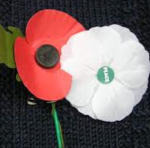Categories
Recent Posts
Blog Stats
- 16,351 hits
making space for play across the life course
In Flanders fields the poppies blow
Between the crosses, row on row
“In Flanders Fields”, Major John McCrae
It’s that time of year when a splash of red brightens the greying days and people pause to remember the fallen. Each year over 50 million poppies are produced by the Poppy Factory in Richmond, south-west London, and Lady Haig’s Poppy Factory in Edinburgh to commemorate members of the armed forces, but an increasing number of people are choosing not to wear them. Why? Many, including World War Two veterans, believe the poppy has been misappropriated. The words of Harry Leslie Smith, a 92-year-old World War Two RAF veteran, are indicative: “the spirit of my generation has been hijacked” by latter-day politicians to “sell dubious wars” in Afghanistan and Iraq. Harry has not worn a poppy since 2013 and is not shy about discussing why.
As I read Harry’s words I’m reminded of an interesting conversation in a local distillery following one of the university’s Centre for European and International Studies Research seminars last year. Whereas some colleagues were vocal about their choice not to wear a poppy because they felt it symbolised a militaristic ethos above all else, others were torn. On the one hand, they shared concerns about militarism and misappropriation. On the other hand, the poppy, over time, had come to represent a private connection to (sometimes distant) family members; a chance to recognise their experience and sacrifice and to stand alongside them (either literally or symbolically). This little red object gave them a chance to share something with loved ones that was difficult to express via other means. Despite my reservations about the poppy, exemplified by recent vilifications of celebrities for not wearing it in public, I’m sympathetic to this view. Every year, my initial thought on the first sighting of the red symbol is my grandfather, a wonderful man I’ve always been extremely close to; and this is less a thought than a very visceral sensation in the pit of my stomach. I’m lucky to still have my grandfather with me, but we don’t speak about his war time experiences; we’re not really a family for talking. Objects of all kinds have always played a large part in our communications: be it fir cones collected on a Sunday afternoon walk, a board game shared on a rainy day, or trowels and seed trays in the garden. I know that he’ll have the Remembrance Sunday service on the TV or radio, and the poppy is a little way of saying, “I know this important to you, we don’t have to talk about it, we can just share a moment, albeit experiencing this moment in our own personal way”.
Then I see the vilifications of those who opt not to wear the poppy and see the TV screens awash with the small red symbol and cynically think about the obligation to be seen displaying it. In November 2013, I was faced with a particular dilemma. Due to administrative delays the start of our ESRC project, ‘Ludic Geopolitics: Children’s Play, War Toys and Re-enchantment with the British Military’ had been pushed back… to the 11th November. The department wanted to make a fuss of the project launch, proud of achieving substantial funding, but I was uneasy. Given the themes of the project I didn’t want people to think the date had been deliberately chosen, that we were making some kind of comment. With the naval history of Portsmouth, Remembrance commemorations are keenly felt. From my office I hear the cannon marking the two minute silence at the 11th hour. In the end the launch was marked by a hand written note, “Ludic Geopolitics starts today” on a single sheet of A4 on the notice board in our departmental office.
Tensions, such as these outlined here, are a feature of our research as we negotiate our multiple roles as academics, family members, children at heart. Within the team there are different attitudes towards the objects we research, which creates a productive tension we are continuing to work through.
 Readers may be interested in reading a recent Guardian article: ‘Five reasons people don’t wear poppies‘, which includes discussion of ‘poppy fascism’ and the white poppy.
Readers may be interested in reading a recent Guardian article: ‘Five reasons people don’t wear poppies‘, which includes discussion of ‘poppy fascism’ and the white poppy.